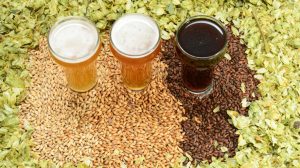
5 Ways Your Hobby Could Become a Source of Extra Income
Have you ever considered turning your passion into profit? Many individuals across the UK are discovering that their hobbies, particularly those related to culinary arts, can be a gateway to additional income.
With the rise of craft production and the growing demand for local, artisanal goods, now might be the perfect time to explore this avenue.
Whether it’s crafting homemade wines or brewing your own beer, your hobby could very well become a small business opportunity.
What Are the 5 Ways Your Hobby Could Become a Source of Extra Income?
1. Exploring the World of Home Brewing

Home brewing has seen a resurgence in popularity, with many enthusiasts finding joy in crafting unique beer flavours.
Starting with a basic home brewing kit, you can experiment with various ingredients, from hops to malt, to create something truly special. The process involves:
- Selecting the right kit: opt for a starter kit that includes all essential equipment like fermenters, airlocks, and sanitising solutions. This ensures you have everything you need to begin your brewing journey.
- Understanding the brewing process: learn about mashing, boiling, fermenting, and bottling. Each step is crucial in crafting a successful brew.
- Experimenting with recipes: as you become more confident, try tweaking recipes or developing your own to create unique flavours that could attract a niche market.
With the burgeoning interest in craft beers, you might find local pubs or restaurants interested in showcasing your creations, especially if they emphasise locally sourced products.
2. The Art of Winemaking
Winemaking at home is another hobby with the potential to transform into a profitable venture.
The UK’s wine scene is thriving, with consumers eager to explore new and locally-produced wines. Here’s how you can tap into this market:
- Start with wine making kits: these kits provide a convenient and reliable way to begin your winemaking journey. They typically include all necessary ingredients such as grape concentrate, yeast, and additives, ensuring you have a solid foundation. Wine making kits allow you to focus on perfecting your technique without the pressure of sourcing raw materials.
- Master the fermentation process: understanding the nuances of fermentation, including temperature control and timing, is key to producing a quality wine.
- Create a brand identity: once you’ve honed your skills, consider developing a brand that reflects your unique style and story. This adds value and appeal to your product.
Local farmers’ markets and food festivals are excellent platforms to introduce your wines to potential customers. Building relationships with local retailers can also pave the way for your brand’s presence in shops.
3. Safety and Quality Assurance
When transforming a hobby into a business, safety and quality are paramount. This is especially true in the food and beverage industry, where regulations are strict. Here’s what you need to consider:
- Adhere to local regulations: familiarise yourself with UK food and drink safety standards. This might involve obtaining licences or registering your production with local authorities.
- Implement quality control measures: regular testing and quality checks ensure consistency and safety in your products. This builds trust with your consumers and helps in maintaining a good reputation.
- Educate yourself and your staff: knowledge about potential hazards and safe production methods is crucial. Attend workshops or courses to stay informed about best practices.
Maintaining high standards not only protects your customers but also enhances your credibility as a producer.
4. Diversifying Your Product Range
As you establish your presence in the market, consider expanding your product range. Diversification can attract a broader audience and increase your income streams. Here are some ideas:
- Introduce seasonal products: craft limited-edition flavours or blends that coincide with seasonal events or holidays. This creates excitement and urgency among consumers.
- Offer tasting experiences: organise tasting events or workshops where customers can learn about your products and the art of brewing or winemaking. This adds an experiential element to your brand.
- Develop complementary products: consider creating accessories or related items, such as branded glassware or gift sets, to accompany your main products.
By broadening your offerings, you not only cater to different tastes but also enhance your brand’s overall appeal.
5. Embracing Online Platforms

In today’s digital age, having an online presence is essential for reaching a wider audience. Embrace technology to boost your business:
- Create a website or online store: showcase your products, share your story, and provide customers with a convenient way to purchase your goods.
- Utilise social media: engage with your audience through social media platforms like Instagram or Facebook. Share behind-the-scenes content, customer reviews, and promotions to create a loyal following.
- Leverage e-commerce marketplaces: consider listing your products on popular e-commerce sites to tap into their vast customer base.
An effective online strategy can significantly increase your reach and sales potential, allowing your small business to thrive in a competitive market.
Turning a hobby into a source of extra income is not only achievable but also incredibly rewarding.
By honing your craft, adhering to safety standards, diversifying your offerings, and utilising online platforms, you can transform your passion into a successful venture.
Whether you’re brewing the next craft beer sensation or crafting exquisite wines, the possibilities are as endless as your creativity. So, why not take the plunge and see where your hobby can take you?





